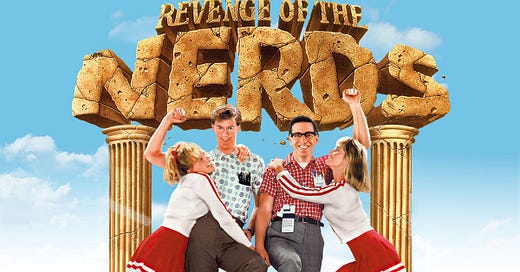Prophecy
In the early 80s, at the height of the Cold War, most normal middle school kids lost sleep from watching the mini-series The Day After, facing the imminent nuclear holocaust. I lay awake, haunted by a different dystopian nightmare—the one portrayed in the comedy film Revenge of the Nerds.
Was this ridicule and cruel torment, I wondered, at the hands of bullies—pranks involving heads inverted in toilets, locker confinement, and the unnatural torsion of underpants—the fate that awaited me, not just in High School, but in … gasp … College?
Nerds, today, are ascendant. Whether it’s the rise of Silicon Valley titans like Bill Gates and Mark Zuckerberg, or the viral spread of internet culture from nerd hotbeds like Reddit across social media, the term nerd no longer carries the sting it once did. I see flawless, high status influencers on TikTok bragging “what a nerd I am” about this or that. As in, “I’m such a data nerd” or “I’m a total knitting nerd” … nerdism being some cute, quirky, and most importantly hidden aspect of their personality—rather than something glaringly obvious, a defining otherness.
I was unequivocally a middle school nerd. My friends were nerds, classic, stereotypical nerds, gifted with academics, poor eyesight and worse hand-eye coordination. We were the last chosen for any game in PE or recess (except for dodgeball, in which case we were the first targeted, first out). We had each other, but longed for social acceptance and inclusion.
To this fragile, pre-adolescent landscape (via HBO, oracle of the adult world in the 1980s) came the deeply disturbing prophecy in Revenge, a cautionary tale for any young nerd who dreamed their life might one day improve.
The film tracks two nerds just as they head to college, believing they had finally escaped all of their social ills for good (surely an institution founded on academics would see past appearances and reward intelligent people like them with high status?), only to find themselves thrust once more back into the old predicament: tormented, bullied, and ostracized. Excluded from the college social scene and Greek system, the nerds band together to form their own fraternity.
In perfect 80s duality, the oppressors are jocks—dumb, rich, and beautiful. Not content merely to enjoy their high status, they derive sadistic pleasure from dominating the meek nerd group.
The rivalry culminates in a silly competition in which the nerds prevail through their ingenuity (a high tech javelin) and creativity (techno music/dance competition), our hero nerd winning the hot sorority girl, newly awakened to his nerdy appeal.
The moral was discomfiting: you may humiliate the bullies, and even get the girl, but in the end, you’re still a nerd. The true prize remained what the jocks have—high status—not self-acceptance.
The Escape
With these dire warnings, I dedicated my high school years to doing whatever it took to fit in.
By happy accident, I became an athlete, myself. I showed some talent for swimming, a sport which leveled the playing field for me by taking hand-eye coordination (or really any reliance on the faculty of sight) off the table.
This gave me a social group with standing, built my body and gave me a feeling of purpose. I wore contact lenses (an uncomfortable match for eyes bloodshot from chlorine), and copied all of the music and fashion trends. I even tried skateboarding, a questionable choice for a pain-averse klutz. I dropped my middle school friends, and did all I could to impress and hang out with upperclassmen, who had no memory of me as a middle school nerd.
My confidence grew, and eventually the opposite sex noticed. I had “made it” as far as I was concerned. By the time I went to college, I had all but forgotten about that worried middle-schooler, afraid of rejection.
In college, I embraced my “nerdy” academic interests. My friends were not classically popular, but nevertheless felt we were ”cool people.” Intellectuals. Artistic. Academic achievers with diverse interests. You get the picture. I’m sure we were insufferable. But Revenge of the Nerds, we were not.
I later chose to work in Tech, the domain of the nerds. Despite my hard-earned social skills, I wrote code, which I (suspiciously) enjoyed. And I found I still liked and sympathized with the quieter people. I felt I had come to terms with all of this, left those silly middle school fears and feelings all in the past. We had all grown up, hadn’t we?
And then I went into management.
Revenge of the Jocks
Suddenly I found myself back on the middle school playground, forced once more to deal with actual bullies. It was ridiculous! I couldn’t believe people sill behaved this way. One of my early VPs literally referred to us—his team—as nerds. Just joking, of course.
The man knew exactly what he was doing, and he knew what worked. Tanned, buff, blithe, and confident—caring nothing for grammar, technical details, or any of the precious things those of us on the nerdy side of the world revere—he had our number, and we had his. Jocks vs. nerds.
He, too, had internalized all the toxic 80s lessons of Revenge of the Nerds. Jocks fight back, and their role is to dominate. When the jocks were humiliated, they were berated for it by an even bigger bully: their coach, played by the brilliant, young John Goodman.
You know, when you were a baby in your crib, and your father looked down at you, he had but one hope - some day my son will grow to be a man. Well look at you now. You just got your asses whipped by a bunch of goddamn nerds. NERDS! Well, if I was you, I'd do something about it. I would get up and redeem myself in the eyes of my father, my maker, and my COACH!
Fear dominates the business world. Fear of falling short of deadlines, goals. Fear of being passed over for promotion, fear of losing your job. And especially under intense pressure, when fear takes over, many of us regress into our respective middle school personas.
Fear dominates the business world. Fear of falling short of deadlines, goals. Fear of being passed over for promotion, fear of losing your job. And especially under intense pressure, when fear takes over, many of us regress into our respective middle school personas.
Jocks bully out of their own insecurity. I didn’t believe my mom when she told me this. Bullies seemed so strong and confident, what do you mean they’re insecure? But of course it’s true. Nerds do the same thing, and turn into bullies when they assert their intellectual superiority.
I see this all the time working in Tech. There are straightforward nerds and jocks, but also weird hybrids. Software architects (nerds) who bully and rule by tearing down everyone’s ideas. Engineering execs (nerds) who fall back on yelling when questioned.
How do we move beyond this—drop these archetypes, recognize and let go of our fears?
Stop The Cycle
I imagine Nerds and Jocks have been at this since the Stone Age, when primitive nerd craftsmen first pointed out the flaws in everyone’s flint arrows, and jock warriors responded by throwing them off a cliff. Here’s how to stop the cycle of revenge.
1. Step out of the game
All social standing is inherently insecure because it rests on the approval of others. And that of course can change at any moment. Those relying on it have to assert their superiority continuously, to reassure themselves that they’re still ok. This alone explains the persistent cruelty of so many high-status people, from actors, executives, and politicians, to those jocks in Revenge.
The only way out of this is to stop playing the status game. This is easier said than done, because you have to start relying on your own opinion, and to do that you have to overcome a lifetime of conditioning. A lot of great people (e.g. Emerson, Thoreau) have written extensively about this, and it’s out of scope for a set of musings on Revenge of the Nerds. But I will cover it in a future post.
I am certain, though, that the first step is to realize that you’re currently playing a game you can never win. You’ll never find security by chasing status.
2. Recognize we’re all vulnerable
Bullies everywhere—including in the workplace—were once bullied themselves when they were younger, by a parent or someone close to them. They bully when they feel vulnerable, afraid no one will respect them unless they use force. They try to mask their vulnerability with bluster, and they do this because it works so often. Most people just don’t want to deal with all the noise.
Of course, a bully acting out is no reason to back down or stop being yourself. It’s important to step out of whatever visceral reaction you’re having and recognize bullying for what it is—the bully announcing their vulnerability to everyone present.
3. Lend a hand
If you keep your cool, look closely, and notice these middle schoolers in your Zoom meeting or boardroom, you can have some sympathy and recognize that the bully or nerd acting out right now might need some help. They feel threatened in some way, or ignored, or are experiencing any number of fears.
What can you do to address their concerns and help bring them back to their adult selves?
This step might take some practice. But I promise you, the mere act of translating some bully’s outburst into a plea for help in your own mind is enough to change the whole dynamic.
So this is the lesson I am taking from Revenge of the Nerds. It’s good that they stood up for themselves, but hopefully in the end they found the self-acceptance they needed. Even if they did get the girl.
All images from Revenge of the Nerds (1984) are the property of 20th Century Fox. They are used here under fair use for the purpose of commentary and analysis.











